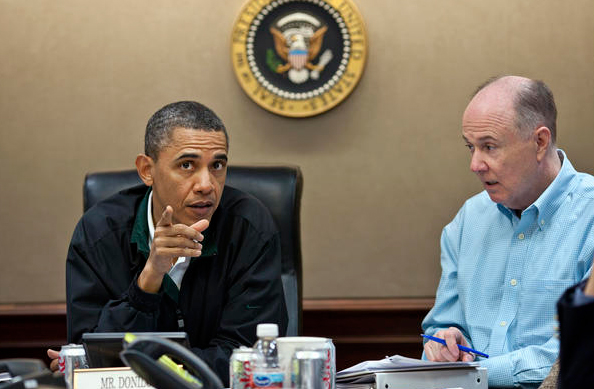
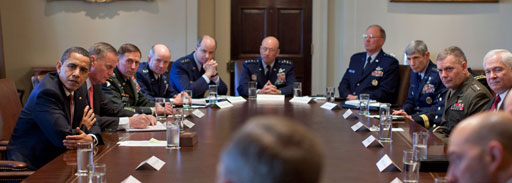
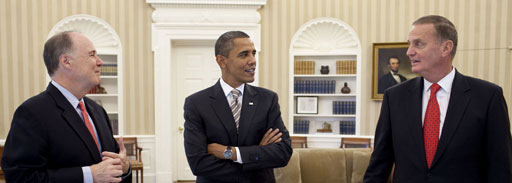
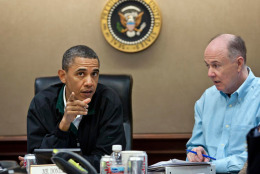
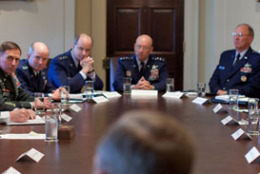
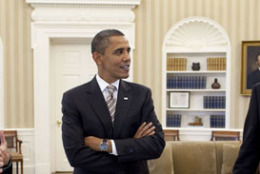
J.J. Green, wtop.com
WASHINGTON – In the past three and a half years, the Obama administration has overseen the killing of Osama bin Laden and radical cleric Anwar al-Awlaki, and the systematic dismantling of al-Qaida. In the same timeframe, longtime dictators were toppled thanks to the Arab Spring.
All were feats that many doubted would ever happen.
Is the National Security Council (NSC) that good or just lucky?
WTOP takes took a close look at the key events that may have set the stage for the stream of success.
In the early days of the Obama administration, media reports painted a picture of turbulence on the national security staff. Unsubstantiated reports of infighting, backstabbing and dysfunction often dominated the headlines. During that time, a figure familiar with high-stakes tension emerged as a calming and guiding force.
Retired Marine Corps Commandant Gen. James Jones, President Barack Obama’s national security adviser from early 2009 until late 2010, told WTOP his story recently. He confirmed, revealed and explained details about the operation of the modern day NSC.
He exited the post sooner than many had expected, but he explained it was by design.
“I agreed with my family that I would commit two years to this effort and the president understood that,” he said. “We had that agreement that was made in Chicago just after the election.”
Jones, now chief executive officer of the Jones Group International, a security and energy consulting firm, set the stage for many of the victories and looks back on the reorganization of the NSC as a pivotal move by the administration.
“I think the very first thing we really did that was consequential was to combine the National Security Council and the Homeland Security Council into one national security staff,” he said.
The goal was “to organize the NSC to reflect the world as it is, not the world that was,” he continued.
That meant economic advisers would be invited to the table along with the military, diplomatic, intelligence, law enforcement and other governmental officials.
“One of the things that President Obama insisted on, early on — and I think he charged me with that — was to make sure that anybody who had equities on an issue was at the table,” he said.
Closing the loop on existential transnational threats like bin Laden may have involved some elements of good fortune, but Jones argues that the people seated at the table are the main reasons for the success.
Stimulating them was the key.
“We tried to flatten the organization so that the issues were discussed from the bottom up instead of from the top down,” he said.
A sense of ownership and a stake in the resolution of the issues of the day were the intended results.
But for every “mission accomplished” moment there are other threats that remain unresolved.
The U.S. national security team still faces tough domestic terrorism threats, some of which may have been inspired abroad in places like Yemen.
“The combination of the inability of the people in Yemen to keep senior [al-Qaida] guys in prison, and the chaos in Yemen now where security forces are focused on domestic security and not al-Qaida, means to me only one thing,” said J. Philip Mudd, former deputy director of the national security branch with the FBI.
“It means the continuation of al-Qaida’s ability to embed in Yemen and the prospect that we’re going to see another underwear bomber or more attempts against cargo aircraft or something broader.”
At the end of the day, Mudd and other top intelligence experts say al-Qaida franchise groups grow smarter and more capable by the day, and it’s going to take ideas to defeat them.
That was something Jones says Obama bought into from the outset.
“This president is not someone who calls everyone into the room and says, ‘Here’s what I’ve decided,’ without analytical rigor,” he said.
Very little is said publicly about the operational structure of the NSC under Obama. Even less is said about how it conducts its daily business. Less still is said to local radio like WTOP.
It’s a matter of efficiency.
Nick Shapiro, a senior aide to John O. Brennan, assistant to the president for Homeland Security and Counterterrorism, politely pointed out in 2009, as WTOP made the first of dozens of requests to date to interview top national security officials, “We don’t believe that interviews on local radio (WTOP) is a good use of our senior staff’s time.”
Regular requests for interviews with Brennan, current National Security Adviser Tom Donilon and Deputy National Security Adviser Denis McDonough continue to date.
Jones said he was disappointed he was never made aware that WTOP had requested interviews with him on many occasions while he was in his post.
Since 2009, the White House national security team has not made certain national security officials available to the local press, but has responded regularly to inquiries about national security events. Interviews with Ben Rhodes, Deputy National Security Adviser to the President for Strategic Communications, were facilitated on two occasions.
Instrumental in the development of national security communications and policy, Rhodes discussed a broad range of threats yet unresolved. He told WTOP in a September 2011 interview that Iran is a major concern.
“Iranian meddling is something that concerns us,” he said. “We, of course, have been very concerned and have spoken out about their efforts inside of Iraq, which included proxy groups which have engaged in attacks on U.S. troops, and their also broader meddling in the region.”
Beyond the meddling, Iran’s nuclear program also worries Washington, he said.
“They continue to fail to demonstrate that their nuclear program is for peaceful purposes and because of that we’ve imposed the strongest sanctions that we’ve seen to date on Iran,” he said.
As time passes and new challenges emerge, Jones’ early architectural efforts on behalf of the administration’s national security team appear poised to continue paying dividends.
Follow J.J. and WTOP on Twitter.
(Copyright 2012 by WTOP. All Rights Reserved.)







